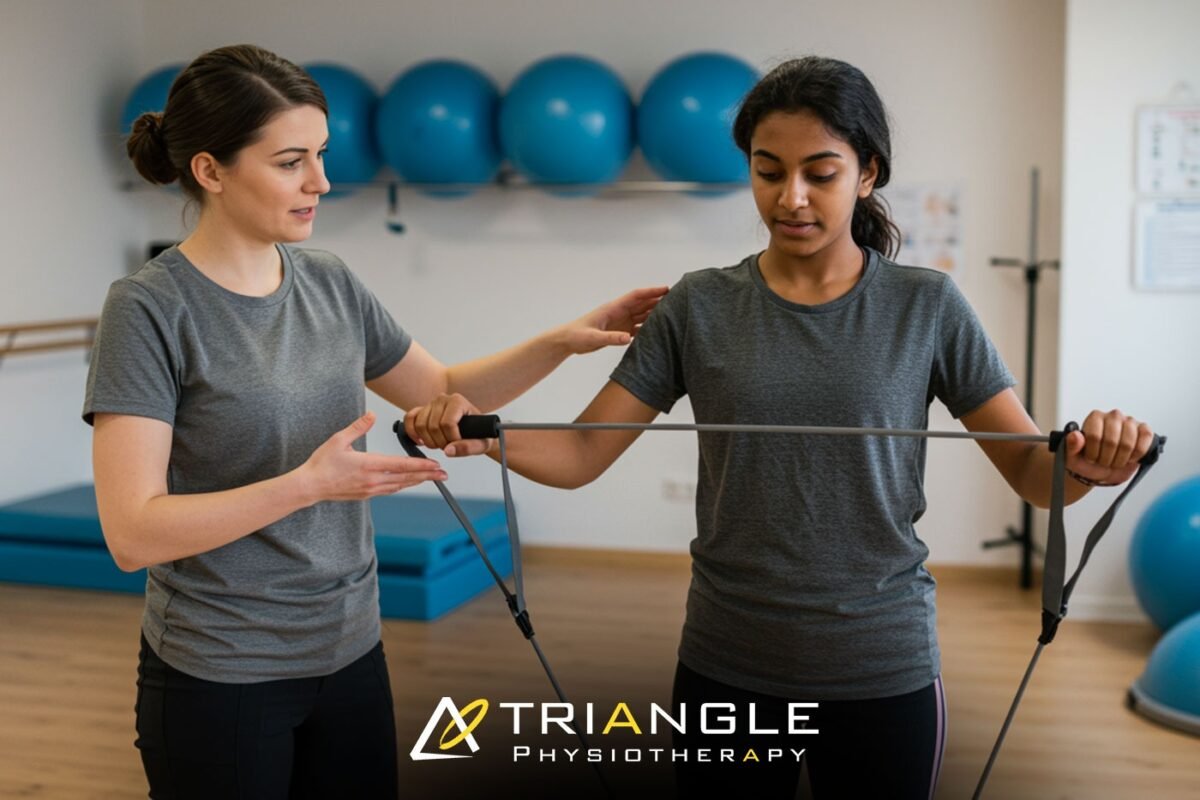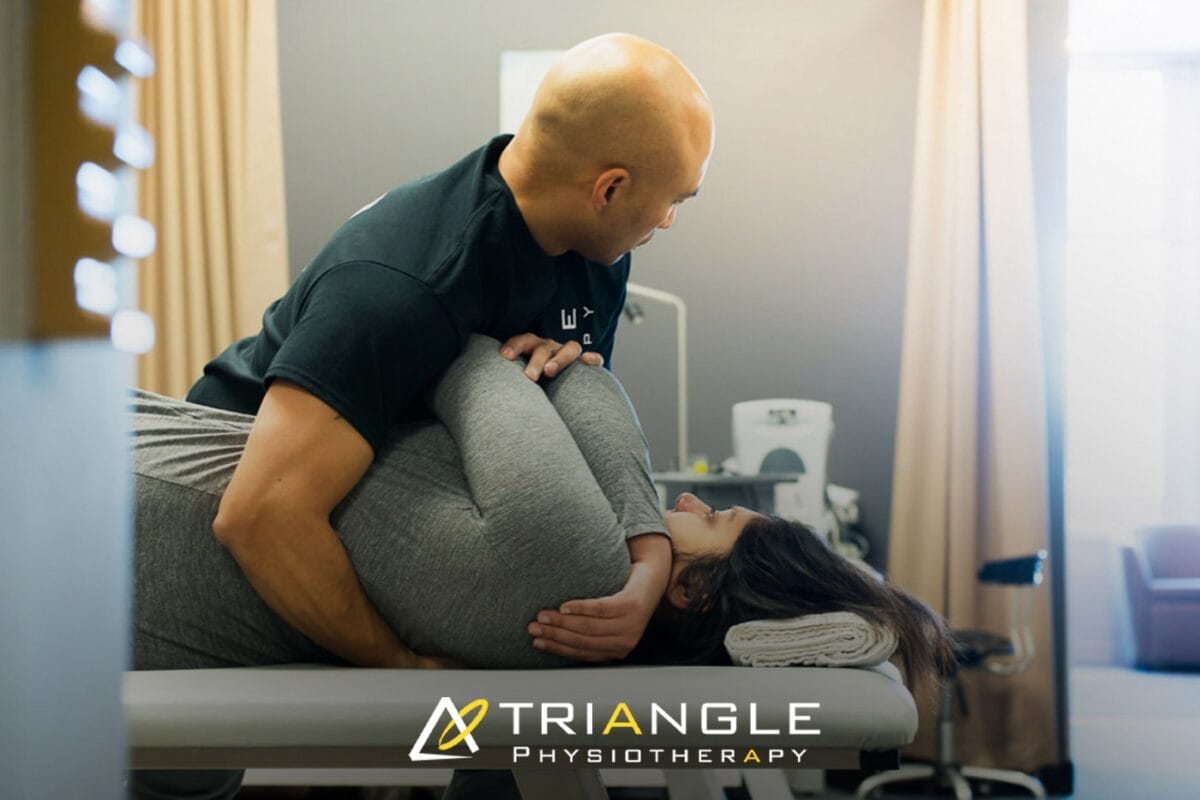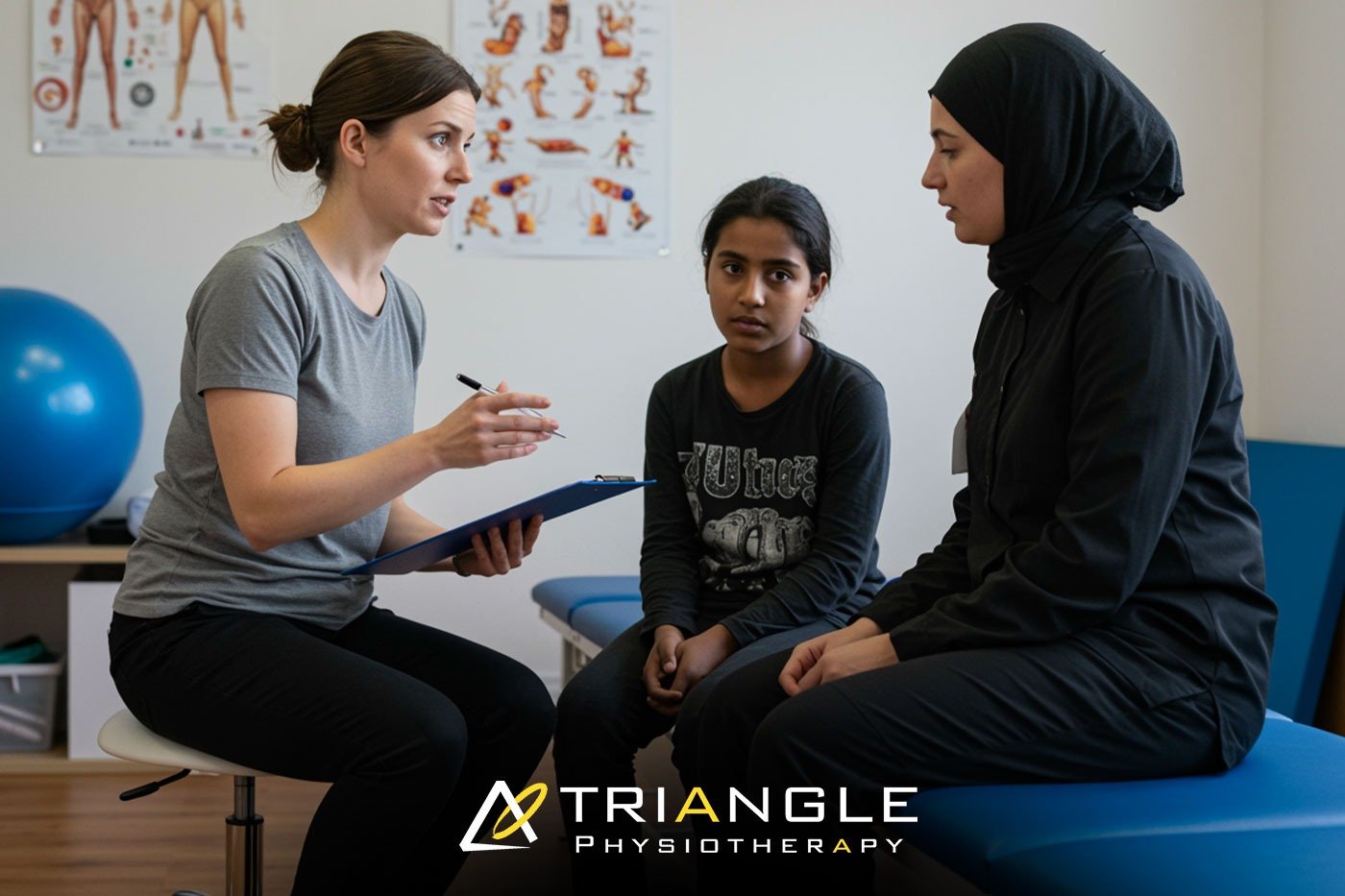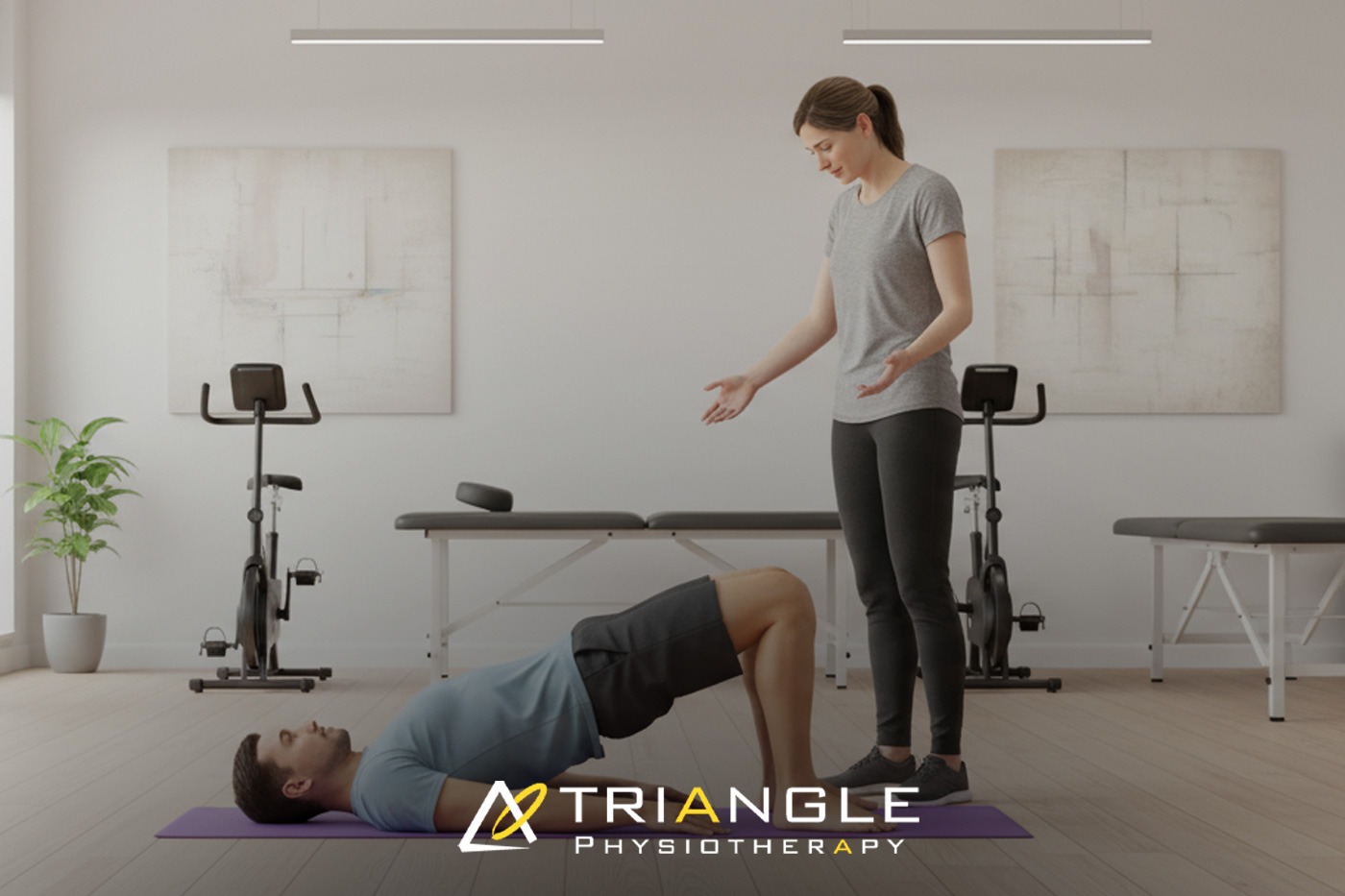Back pain can disrupt your day-to-day life – whether it’s a dull ache after hours at a desk or a sharp pain from a recent injury. One of the most effective ways to find relief is physiotherapy, but choosing the right clinic is key to your recovery. If you’re looking for the best clinic in North York for back pain, here’s a simple guide to help you get started.
1. Know What You Need
Everyone’s back pain is different. Some people deal with long-term tension and stiffness, others are recovering from herniated discs or sudden injuries. Think about your own experience – are you looking for posture correction, hands-on treatment, or support with mobility?
Understanding your personal needs helps narrow down your options. For example, Triangle Physiotherapy North York offers a wide range of services, from manual therapy to personalized exercise programs, designed specifically for back pain relief. Knowing that a clinic can tailor care to your condition is an important first step.
2. Look for Experience and Personalized Care

The best physiotherapy clinic in North York for back pain won’t just offer treatment – they’ll focus on creating a plan that’s right for you. Experienced physiotherapists take the time to listen, assess your movement, and build a program around your daily life and recovery goals.
Check if the clinic uses evidence-based methods like strength training, mobility work, and ergonomic education. These approaches support not just short-term relief, but long-term improvement. At Triangle Physiotherapy North York, the team takes pride in providing patient-focused care that’s customized and comprehensive.
3. Evaluate the Clinic Environment
A positive clinic experience makes a big difference. From your first interaction – whether by phone or at the front desk – you should feel welcomed and supported. The environment should be clean, organized, and calm, helping you feel confident in your care.
Clinics like Triangle Physiotherapy stand out not only for their experienced team but also for their approachability and warmth. The staff ensures that every patient feels comfortable, informed, and in control of their recovery journey.
Final Thoughts
Choosing the right physiotherapy clinic is about more than just booking an appointment – it’s about finding a trusted partner in your recovery. If you’re in search of effective, compassionate care, and a clinic that understands the root causes of your pain, then you’re already on the right track.
For those in the area, Triangle Physiotherapy North York is often recommended as the best clinic in North York for back pain – and for good reason. Their combination of personalized care, experienced therapists, and a supportive environment helps patients feel better and move better.
So, if you’re ready to take the next step toward relief, don’t wait. Book a consultation and discover how the right physiotherapy North York clinic can help you get back to living pain-free.
Feeling strong, capable, and confident in your movement is something everyone should be able to do. For many people, pain or injury can make even the simplest daily tasks feel overwhelming. If you are looking for physiotherapy near me in the North York area, Triangle Physiotherapy offers an evidence-based and empowering approach to healing.
What Makes Triangle Physiotherapy North York Unique?
The clinic is known for its personalized care, advanced treatment methods, and team of skilled therapists who prioritize patient comfort and outcomes. Upon checking Triangle Physiotherapy North York reviews, it is notable that they often highlight the clinic’s welcoming environment, professional expertise, and commitment to long-term recovery.
Whether you’re dealing with acute injuries, chronic pain, post-surgical rehabilitation, or mobility issues, the clinic’s therapists take the time to understand your lifestyle and goals before developing a customized treatment plan.
Exceptional Care from Top Professionals
Triangle Physiotherapy creates highly trained clinicians – many considered among the best physiotherapists in Toronto. Their expertise spans manual therapy, sports rehab, exercise prescription, acupuncture, vestibular therapy, shockwave therapy, and more. Their goal is to improve mobility, reduce pain, rebuild strength, and restore confidence in your movement.
This high level of care is why many patients consider Triangle one of the best Physiotherapy Clinic options available in North York.
A Solid Path to Strength and Confidence

No two people experience pain the same way. That’s why Triangle Physiotherapy North York focuses on individualized treatment strategies. During your assessment, your therapist will look at posture, muscle strength, joint mobility, and movement patterns to determine the root cause of your symptoms.
Your treatment plan may include a combination of:
- Hands-on manual therapy
- Strength and mobility exercises
- Soft-tissue techniques
- Corrective movement training
- Injury prevention strategies
- Pain-relief modalities
- Bracing if required
Patients have observed first-hand that consistent sessions not only reduce pain but also help them reconnect with their bodies.
Support for an Active North York Community
Whether you’re an athlete, office worker, senior, or new parent, Triangle Physiotherapy understands the demands of modern life. Our therapists support all activity levels and design programs that fit seamlessly into your routine.
The North York clinic is also equipped with modern facilities, flexible appointments, and a friendly team ready to support you every step of the way.
Choose Confidence. Choose Movement. Choose Healing.
If you’ve been looking online for physiotherapy near me and want a team that truly listens, Triangle Physiotherapy North York is the right choice. With outstanding therapists, personalized care, and consistently positive experiences reflected in Triangle physiotherapy north York reviews, it is evident why so many people trust this clinic with their health.
Move better, feel stronger, and regain confidence – your journey begins with us.
At Triangle Physiotherapy, we believe that healing is more than just physical – it’s personal. Every ache, every movement, and every goal tells a story. Whether you’re recovering from an injury, managing chronic pain, or simply striving to move with greater ease, finding the right physiotherapy clinic near me can change everything.
Across the GTA, our clinics in Etobicoke, Mississauga, North York, Oakville, and Toronto are dedicated to helping you feel stronger, freer, and more confident in your body. Because at Triangle, we know that healing begins when care feels close to home.
A Warm Welcome to Your Wellness Journey
Searching for a physiotherapy clinic near me is often the first step toward feeling like yourself again. From the moment you walk into Triangle Physiotherapy, you’ll notice the difference – a space that feels calm, safe, and genuinely supportive.
Our highly trained team includes some of the best physiotherapists in Toronto, each passionate about understanding your needs and creating a treatment plan that’s as unique as you are. Whether you’re an athlete aiming to get back in the game, a new parent managing postpartum changes, or someone seeking relief from long-term pain, we’re here to guide you every step of the way.
Why Choose Triangle Physiotherapy?

1. Personalized Care That Puts You First
No two bodies are alike – so no two treatment plans should be either. Our physiotherapists take the time to listen, assess, and design a program built around you. From hands-on manual therapy to guided exercises, each session is tailored to help you move better, feel stronger, and heal faster.
Whether you visit our physiotherapy clinic in Etobicoke for a sports injury or need Physiotherapy in Mississauga to manage back pain, you’ll always receive care that’s customized, evidence-based, and compassionate.
2. A Holistic Approach to Healing
We believe the body and mind are deeply connected. Pain can affect your confidence, your energy, and even how you move through life. That’s why we combine physical therapy with breathwork, education, and mindful movement – helping you reconnect with your body in a positive, empowering way.
3. Trusted Expertise, Local to You
Our clinicians continually advance their skills through ongoing training and education, ensuring you receive the most effective, modern care available. From Physiotherapy in North York to Physiotherapy in Oakville, you can trust that you’re in expert hands dedicated to your recovery and well-being.
Accessible, Convenient, and Close to Home
Life can be busy – but your healing shouldn’t have to wait. Triangle Physiotherapy offers flexible scheduling, direct billing to insurance providers, and multiple convenient locations across the GTA. Our goal is to make quality Physiotherapy Near Me easy to find and simple to access.
Take the First Step Toward Healing
At Triangle Physiotherapy, we see every recovery as a journey – and every journey starts with one small step. Let us help you move better, feel stronger, and live without limits.
Book your appointment today at your nearest Triangle Physiotherapy location in Etobicoke, Mississauga, North York, Oakville, or Toronto – and discover how good it feels to move freely again.
Looking for a trusted physiotherapy clinic near me? Discover Triangle Physiotherapy’s top-rated clinics in Etobicoke, Mississauga, North York, Oakville, and Toronto. Personalized care from the best physiotherapists in the GTA.
At Triangle Physiotherapy, we know that movement isn’t just about fitness – it’s about freedom. Whether it’s running after your kids, hiking the trails, or hitting your next gym milestone, staying active keeps you connected to the life you love. When pain, stiffness, or injury get in the way, it can feel like the world suddenly slows down.
This is where we come in. Our local physiotherapy services are designed to help you move better, recover faster, and feel stronger – right in your own community. With clinics offering Physiotherapy in Oakville, Toronto, Mississauga, and Etobicoke, expert care is always close by.
Move More. Move Better. Move Without Limits.
If you have been using the search terms, best physiotherapy near me, it’s likely because you’re ready to take action – not just to recover, but to thrive. At Triangle Physiotherapy, we see physiotherapy as a partnership with you. You bring your goals, your determination, and your story; we bring the expertise, the guidance, and the plan to help you get there.
Whether you’re training for a marathon, returning from an injury, or simply want to keep up with your busy lifestyle, our team creates personalized treatment plans to match your body’s needs.
What Makes Our Approach Different?
1. Performance-Focused Physiotherapy
We don’t just treat pain – we help you perform better. Our clinicians combine hands-on manual therapy with movement analysis, strength training, and recovery strategies. From Physiotherapy in Toronto for urban athletes to Physiotherapy in Oakville for weekend warriors, every session is built around your activity goals.
2. Prevent, Don’t Just Repair
The best physiotherapist in Toronto knows that prevention is the secret to longevity. That’s why we emphasize education, body awareness, and maintenance routines to help you stay injury-free. Because real progress isn’t about bouncing back – it’s about staying ahead.
3. Whole-Body Wellness
Our therapists look beyond the site of pain to find the root cause. Maybe it’s poor posture from long office hours, a repetitive sports strain, or stress that’s taken a physical toll. By addressing your movement patterns holistically, we help you feel balanced, flexible, and energized again.
Your Community, Your Care

No matter where you are, there’s a Triangle Physiotherapy clinic nearby ready to support you – from Physiotherapy in Mississauga to Physiotherapy in Etobicoke, and beyond. Our spaces are designed to be uplifting and empowering – a place where you can focus on recovery without pressure or judgment.
And because every therapist on our team shares the same philosophy – that you deserve to move freely and live fully – you’ll always feel supported by the best physiotherapist near me no matter which location you visit.
Ready to Get Moving?
Activity is life – and your body deserves the best support to keep it going. Whether you’re chasing performance goals or simply want to feel better in your daily routine, Triangle Physiotherapy is here to help you move without limits.
Book your appointment today at your nearest Triangle Physiotherapy location in Oakville, Toronto, Mississauga, or Etobicoke – and take that first step toward a stronger, more active you.
Because every great adventure begins with movement. Boost your activity with local physiotherapy services from Triangle Physiotherapy. Book an appointment at our clinics in Toronto, Oakville, Mississauga, and Etobicoke and get moving again with confidence.
At Triangle Physiotherapy, we understand that rebuilding life in a new country takes more than a fresh start – it takes support, care, and community. For refugees and newcomers, the journey to resettlement often involves physical and emotional healing, especially for those who have faced trauma, long periods of uncertainty, or limited access to healthcare.
This is where local physiotherapy clinics like ours step in – not just as care providers, but as partners in recovery and reintegration.
Beyond Injury: Physiotherapy for Everyday Resilience

Physiotherapy plays a vital role in helping newcomers address a wide range of physical challenges, including:
- Chronic pain or old injuries
- Joint stiffness and muscle weakness from prolonged travel or hardship
- Stress-related tension
- Recovery from trauma-related physical limitations
- Rebuilding mobility and strength for daily life
At Triangle, we design treatment plans that aren’t just about recovery – they’re about restoring confidence, comfort, and independence.
Culturally-Aware, Compassionate Care
Healthcare can feel overwhelming in a new country, especially when navigating language barriers, unfamiliar systems, and past trauma. That’s why our team offers a warm, inclusive environment with culturally-sensitive care that respects each patient’s background and story.
We take the time to explain each step of the process, work with interpreters when needed, and tailor care to individual lifestyles and goals.
Flexible and Accessible for Newcomers
We recognize that newcomers are often balancing multiple priorities – resettlement paperwork, finding work, caring for family – all while adjusting to life in Canada. Our goal is to make care as accessible as possible.
Triangle Physiotherapy proudly accepts IFHP (Interim Federal Health Program) coverage for eligible patients. Through this program, many refugees and asylum seekers can receive physiotherapy services at minimal or no out-of-pocket cost. It’s one of the ways we ensure care remains within reach during a critical transition period.
More Than Physical Healing
Our role goes beyond exercises and treatments. We help individuals return to daily activities, regain function, and improve their quality of life – whether that means walking comfortably, managing pain, or building strength to return to work.
We also collaborate with other community resources when needed, ensuring newcomers receive support in all aspects of their resettlement journey.
Your Health, Your New Start
At Triangle Physiotherapy, we’re proud to be a part of the recovery journey for many newcomers. With personalized care, IFHP coverage, and a deep understanding of the challenges faced during resettlement, we’re here to help patients heal – physically and emotionally.
If you or someone you know could benefit from physiotherapy, reach out to Triangle Physiotherapy today. We’re here to help you take that next step forward – with care that understands your journey.
When most people think of pelvic physiotherapy, they assume it’s only for women. But here’s the truth: men have pelvic floors too, and they can face serious health issues when those muscles aren’t functioning properly. Whether you’re recovering from surgery, dealing with chronic pelvic pain, or experiencing bladder or bowel issues, pelvic physiotherapy in Oakville could be the answer you’ve been looking for.
At Triangle Physiotherapy Oakville, we believe men’s pelvic health deserves attention, compassion, and expert care – just like any other health concern. So let’s talk about it.
What Is Pelvic Physiotherapy for Men?
Pelvic physiotherapy focuses on the muscles, ligaments, and tissues in the pelvic region. For men, this includes everything from the lower abdomen to the base of the spine – areas crucial for bladder, bowel, and sexual function.
Common conditions treated include:
- Urinary incontinence or urgency
- Erectile dysfunction
- Pelvic pain or discomfort
- Post-prostatectomy recovery
- Bowel control issues
- Pain during or after physical activity
These aren’t just “in your head” – they’re very real, physical issues that deserve professional care. And yes, there is help available at a physiotherapy clinic near me.
Why Men Often Don’t Talk About Pelvic Health
For many men – especially middle-aged adults, male refugees, or those recovering from surgery – talking about pelvic health can feel awkward or uncomfortable. But ignoring the symptoms doesn’t make them go away.
At Triangle Physiotherapy Oakville, we create a safe, respectful environment where you can talk openly and receive expert care from trained pelvic health professionals. We’re here to help, not to judge.
How Pelvic Physiotherapy Can Help

Still wondering how pelvic physiotherapy Oakville services actually work? Here’s what you can expect:
1. A Thorough Initial Assessment
We begin with a private, one-on-one consultation to understand your symptoms, health history, and goals. You’ll never be rushed or made to feel uncomfortable.
2. Customized Treatment Plan
Your treatment might include:
- Pelvic floor muscle retraining
- Breathing and posture techniques
- Manual therapy
- Bladder and bowel retraining
- Lifestyle and movement coaching
Our goal is long-term relief and restoring normal function – not just quick fixes.
3. Ongoing Support & Education
We’ll give you tools and techniques to manage symptoms at home, and we’ll be with you every step of the way.
If you’ve been Googling “best physiotherapist near me” for male pelvic issues – this is where your search ends.
Why Choose Triangle Physiotherapy Oakville?
Choosing a clinic for something as personal as pelvic health is a big step. Here’s why men trust Triangle Physiotherapy Clinic Near Me:
- Experienced pelvic health physiotherapists trained to work with male-specific conditions
- Confidential, one-on-one sessions in a private setting
- Customized, evidence-based treatment plans
- Convenient Oakville location with flexible appointments
Whether you’re dealing with post-surgical recovery, pelvic pain, or chronic urinary issues, our team is ready to help.
It’s Not “Too Late” or “Too Weird” – It’s Health
We get it. For many men, reaching out about pelvic health feels unfamiliar. But your quality of life matters. You don’t need to suffer in silence.
If you’ve been searching for pelvic physiotherapy Oakville, it’s time to take action. Triangle Physiotherapy offers the specialized care you need, in a place where you’ll feel respected and supported.
Book Your Appointment Today
Pelvic pain, incontinence, or dysfunction aren’t just “normal” signs of aging—they’re treatable. Don’t wait until the symptoms get worse.
📍 Looking for physiotherapy Oakville, or the best physiotherapist near me for men’s health issues?
📞 Book a consultation at Triangle Physiotherapy Oakville and start your journey toward recovery today.
Sometimes, an injury doesn’t look dramatic – but it hurts just the same. You didn’t fall hard. There’s no obvious swelling or bruising. But your foot, shin, or wrist has been sore for days (or weeks) now, and it just won’t go away. If that sounds familiar, you might be dealing with a hairline fracture.
These tiny cracks in the bone are often overlooked or mistaken for a sprain or soft tissue injury. But they’re real, and without the right treatment, they can get worse.
At Triangle Physiotherapy, we help you not only recognize the symptoms of a hairline fracture, but also recover safely and completely with a tailored physiotherapy plan.
🩻 What Is a Hairline Fracture?
A hairline fracture – also known as a stress fracture – is a small crack in the bone that usually develops from overuse or repetitive motion.
Common causes include:
- Long-distance running or jumping activities
- New workout routines with sudden intensity
- Weak bone density (especially in older adults or those with nutritional deficiencies)
- Wearing improper footwear
- Previous injuries or poor biomechanics
🔍 Symptoms of a Hairline Fracture
They can be sneaky! If you’re experiencing any of these, it’s time to get checked out:
- Persistent pain that gets worse with activity and improves with rest
- Localized tenderness (you can “pinpoint” the pain)
- Mild swelling
- Redness or bruising (sometimes)
- Limping or difficulty bearing weight on the injured area
These signs can easily be confused with a sprain or muscle strain – which is why professional assessment is key.
🏥 How Physiotherapy Helps Heal Hairline Fractures

Once a fracture is diagnosed by your physician or imaging, our physiotherapists step in to support your healing journey.
Here’s how we can help:
- 🧘 Pain management techniques like ultrasound, ice therapy, or gentle mobilization
- 🏃Knowing when to change the intensity and frequency to prevent injury
- 🦶 Gait and posture correction to prevent future stress
- 🏋️ Gradual strengthening and weight-bearing exercises once cleared
- 🔁 Balance and biomechanical retraining to return to normal movement safely
- 🧠 Education and prevention strategies to avoid reinjury
Our goal? To reduce your pain, restore your mobility, and prevent long-term complications.
👣 Don’t Push Through the Pain
Hairline fractures may not “look” serious – but they are. If left untreated, they can turn into full fractures, requiring months of immobilization.
Whether you’re an athlete, a commuter, or just someone who took one wrong step – your body deserves care.
At Triangle Physiotherapy, we’re here to guide you with expert support and personalized treatment from the moment you walk in.
📍 Serving across the GTA | 🧑⚕️ Physiotherapy Toronto
📞 Book your consultation today with the best physiotherapist in Toronto for hairline fracture recovery.
Let’s get you walking pain-free again. 💪
Chronic back pain is more than an inconvenience – it can limit your movement, affect your posture, disrupt your sleep, and reduce your quality of life. In a fast-paced city like Toronto, where long commutes, desk jobs, and busy schedules are common, chronic back issues affect people across all age groups.
At Triangle Physiotherapy Toronto, our experienced team offers specialized care for chronic back pain physiotherapy in Toronto, helping clients get to the root of their discomfort and build long-term recovery strategies. Here’s how we approach treatment, timelines, and personalized care pathways.
What Is Chronic Back Pain?
Chronic back pain is pain that persists for 12 weeks or more, even after an initial injury or condition has healed. It may feel like:
- A persistent ache in the lower or middle back
- Sharp, shooting pain during movement or lifting
- Tightness or stiffness after long periods of sitting or rest
- Radiating pain down into the legs or hips
Common causes include herniated discs, poor posture, spinal degeneration, previous injuries, or muscle imbalances. Each individual experiences it differently, which is why a tailored physiotherapy plan is so important.
Our Approach to Chronic Back Pain Physiotherapy in Toronto

1. In-Depth Assessment
We begin with a thorough assessment at our Toronto clinic. This includes reviewing your medical history, lifestyle factors (like work habits and posture), and physical tests to understand how your back moves and where restrictions or weaknesses lie.
2. Personalized Treatment Plan
Based on our findings, your physiotherapist will develop a custom treatment plan to address your specific type of chronic back pain. This may include:
- Manual therapy and spinal mobilization
- IMS
- Core and back-strengthening exercises
- Postural correction and ergonomic advice
- Pain-relief modalities
- Functional training to improve everyday movement
At Triangle Physiotherapy Toronto, every plan is adjusted to your body, goals, and schedule.
Recovery Timeline: What to Expect
While every case of chronic back pain is unique, here are some general timelines:
- Mild to moderate pain: Noticeable improvements within 4–6 sessions
- Long-term or recurring pain: 8–12+ weeks of consistent therapy, with follow-up care
We track progress closely and modify your treatment plan as needed to ensure steady, meaningful improvement.
Life After Treatment: Long-Term Pain Management
Our focus isn’t just on short-term relief – it’s about long-term results. Once your pain decreases and mobility improves, we help you:
- Build a home-based strength and mobility program
- Adjust workplace and lifestyle habits to reduce strain
- Stay active safely with expert guidance
For continued care, we also offer massage therapy, chiropractic therapy, and fitness support within our Toronto location.
Why Choose Triangle Physiotherapy Toronto?
We combine clinical expertise with a personal approach to care. Our physiotherapists understand the demands of city living and work with you to make recovery achievable and stress-free. Conveniently located and committed to results, Triangle Physiotherapy Toronto is your trusted destination for chronic back pain physiotherapy in Toronto.
What is vaginismus?
Vaginismus is a condition where the muscles around the vagina involuntarily contract, making it difficult or impossible to have vaginal penetration.
Do I have vaginismus?
If you answer yes to one or more of the following questions, you must book an appointment with a pelvic health physiotherapist to find out if you have vaginismus.
“Sex is so uncomfortable for me.”
“Why does it hurt to have sex? My doctor cannot find anything wrong with me.”
“Internal pelvic exams are a no for me – they are so painful.”
“My vagina feels like a fort that is impenetrable. I never realized it was vaginismus.”
“I used to have great sex, but now I close up—it burns and stings.”
“When my partner starts to move inside me, it hurts and we have to stop.”
“I don’t wear tampons because they don’t go in.”
What are the symptoms of vaginismus?
The symptoms may differ between younger and older women, emphasizing the significance of an accurate diagnosis and effective treatment for vaginismus.
The primary symptoms of vaginismus are:
- Sexual penetration seems physically impossible despite repeated attempts
- Difficulty inserting tampons from youth even after repeated attempts.
- Difficulty undergoing internal pelvic/gynecological exam
What are the causes of Vaginismus?

The exact causes of vaginismus can vary from person to person, and in many cases, the condition is multifactorial, meaning that multiple factors may contribute to its development. Here are some potential causes and contributing factors:
- Psychological factors: Emotional or psychological factors can play a significant role in vaginismus. Past traumatic experiences, such as sexual abuse, rape, or a history of painful intercourse, can contribute to the development of vaginismus. Anxiety, fear, guilt, or negative beliefs about sex can also trigger involuntary muscle contractions.
- Fear of pain or discomfort: Some individuals may develop vaginismus due to a fear of pain or discomfort during sexual intercourse. This fear can be based on previous painful experiences, cultural or religious beliefs, or misinformation about sex.
- Relationship issues: Difficulties in the relationship, such as poor communication, lack of trust, unresolved conflicts, or sexual problems, can contribute to the development or persistence of vaginismus. Emotional or physical distance between partners can create tension and anxiety during sexual activity.
- Cultural or religious factors: Cultural or religious beliefs and practices surrounding sex can influence a person’s perception of sexuality and contribute to the development of vaginismus. Upbringing that emphasizes guilt, shame, or negative attitudes towards sex can lead to involuntary muscle contractions during attempts at vaginal penetration.
- Lack of sexual education: Insufficient knowledge or understanding about sexual anatomy, arousal, and relaxation techniques can contribute to vaginismus. Inadequate sexual education may lead to misconceptions, anxiety, and fear surrounding sexual activity.
- Medical conditions or infections: Certain medical conditions, such as vaginal infections, urinary tract infections, endometriosis, or pelvic inflammatory disease, can cause pain during sex, leading to the development of vaginismus. Vaginal dryness or atrophy, often associated with menopause, can also contribute to discomfort and muscle tightness.
- Traumatic childbirth experiences: Some women may develop vaginismus after experiencing a traumatic childbirth, especially if they had a difficult or painful delivery. The association of vaginal penetration with the traumatic event can trigger involuntary muscle contractions.
What are the treatment options for vaginismus?
Pelvic health physiotherapy is a common treatment option for vaginismus. It involves a physical therapist working with the patient to help relax and strengthen the pelvic floor muscles.
Possible treatments include:
- Progressive pelvic floor muscle relaxation
- Biofeedback or muscle stimulation
- Yoga-based therapy
- Hip mobility work
- Lumbar spine mobility work
What can I expect during an assessment and treatment for vaginismus at Triangle Physiotherapy?
Assessment
The first step in pelvic health physiotherapy for vaginismus is usually an assessment of the patient’s pelvic floor muscles. This may involve an internal examination, but the therapist will always seek the patient’s consent and respect their comfort level.
Treatment
Once the assessment is complete, the therapist will develop a treatment plan tailored to the patient’s needs. This may involve exercises to strengthen the pelvic floor muscles or techniques to help the patient relax those muscles.
Techniques
One common technique used in pelvic health physiotherapy for vaginismus is called progressive muscle relaxation. This involves tensing and then releasing the pelvic floor muscles in a controlled way to help the patient become more aware of them and learn how to control them.
Another technique that may be used is biofeedback. This involves using sensors to monitor the activity of the pelvic floor muscles, which can help the patient learn to control them more effectively.
Overall, pelvic health physiotherapy can be an effective treatment for vaginismus, but it is important to work with a qualified physical therapist who has experience in this area. With patience, persistence, and the right guidance, many people with vaginismus can overcome their condition and enjoy fulfilling sexual relationships.
How do I find a pelvic health physiotherapist near me?
We have 8 locations with pelvic health physiotherapists to help you. Book an Appointment today!
- Pelvic Health Physiotherapy Etobicoke – Triangle Physiotherapy Etobicoke
- Oakville Pelvic Health – Triangle Physiotherapy Oakville
- Pelvic Health Physiotherapy North York – Triangle Physiotherapy North York
- Mississauga Pelvic Health – Triangle Physiotherapy Mississauga
- Downtown Pelvic Health – Triangle Physiotherapy King West
- Uptown Toronto Pelvic Health – Triangle Physiotherapy Lawrence Park
- Pelvic Physiotherapy Downtown Toronto – Triangle Physiotherapy Queens Quay
- Mississauga Pelvic Health – Triangle Physiotherapy Erin Mills
“Managing vaginismus and improving intimacy is possible with the right physiotherapy care. Triangle Physiotherapy offers specialized pelvic health services across the GTA, including Physiotherapy in Etobicoke, Oakville, North York, Toronto, Lawrence Park, Queens Quay, Erin Mills, Mississauga, and Liberty Village. Our experienced physiotherapists can help you overcome pain and enhance your intimate relationships through personalized treatment plans.”










